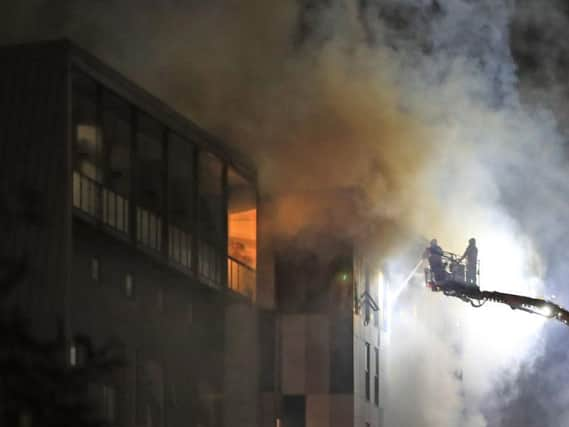MSPs to be warned of new fire risk from cladding and insulation on public buildings


The warnings about laminate cladding - which is different to the aluminium cladding which burned during the Grenfell disaster - will be put to a Holyrood committee tomorrow, with politicians urged to ban combustible materials.
The block of flats in Bolton went up in flames at the weekend, and while an investigation into how it began and spread is still being conducted, the town's mayor highlighted the fact that the building was constructed with high pressure laminate.
Advertisement
Hide AdAdvertisement
Hide AdToday the Scottish Government said the laminate cladding would be included in an inventory it is collating of public buildings in light of the Grenfell fire, and government minister Kevin Stewart pledged the findings of the Bolton fire would be reviewed and "appropriate action taken."
The UK government has already issued advice notes to the construction industry and local government on the use of high pressure laminate and also spandrel panels - two common types of materials used to cheaply clad new-build schools, hospitals, student accommodation and other public buildings - and the insulation which is used with them.
The advice notes warn that building owners, particularly those of high rises, should check what insulation is used with the cladding types, and if they are assessed as "unsafe" because of combustibility, they should be removed.
However, a source in the cladding industry told The Scotsman that many architects are unaware the guidance even exists, and warned of an "expensive timebomb" for public authorities who would need to replace either the cladding, and building insulation - which could just be a sheet of styrofoam - or both, to ensure they reduce the fire risk.
A producer of building insulation materials, Rockwool, has also written to MSPs urging a full audit "of all high-rise buildings and for the removal of any combustible insulation and cladding found".
A report by the firm states that "people have a right to expect that the buildings they live, work and study in are safe" and recommends the government takes urgent steps to ban combustible materials and enshrine it in legislation; to complete an audit of existing buildings to identify all combustible facade materials; and the removal of combustible materials and cladding below the industry's Euroclass B standard.
Today in Holyrood the safety of cladding on student accommodation was raised by Scottish Green MSP Andy Wightman, who asked what work was being done to ensure Scotland's students were safe in light of the fire in Bolton.
He said that the blaze had been "incredibly scary" and eyewitnesses had said "the fire crawled up the cladding like it was nothing".
Advertisement
Hide AdAdvertisement
Hide AdMr Stewart, the minister for local government, housing and planning, said the duty for fire safety risk assessments lay with the landlords, but added that the government had written "to a range of bodies in June, including the Scottish Funding Council, representing colleges and universities, to raise awareness of cladding tests being commissioned by the UK government which may prove useful as part of such risk assessments."
He said: "Any significant fire in a residential building is a concern for all of us. Greater Manchester Fire and Rescue Service has said their investigation into the Bolton fire will consider the role external cladding played into the development and spread of the fire. Once that information is available we will review the findings and take the appropriate action necessary."
Mr Stewart said "a database" to contain safety information and "an inventory" was being developed to provide a central source of information on cladding - including the high pressure laminate which was on the Bolton building.
Tomorrow the issue will be discussed at Holyrood's Local Government and Communities Committee, where MSPs will also be urged to stop relying on a "discredited" fire safety test which has already been ditched by the UK government.
The Association of British Insurers, which will attend tomorrow's meeting, has said the BS 8414 test used to test the safety of the cladding was “utterly inadequate” as it under-estimated the ferocity and spread of real blazes.
Speaking ahead of the session, convener, James Dornan MSP, said: “After the Grenfell Tower tragedy in 2017, and last week’s student accommodation fire in Bolton, the issue of fire safety in our homes has been of deep concern for people across the country.
"The committee is determined to investigate whether current building standards are robust enough to ensure that people in Scotland can feel safe and not at risk.
“We are looking forward to hearing from experts on whether current rules around cladding are sufficient in minimising the risk of fires, especially in high rises."
Advertisement
Hide AdAdvertisement
Hide AdHe added: “The committee is also aware of reports that homeowners in some high rise blocks have found their properties to be valued at zero, due to a lack of cladding certification. This means that they are for now ‘unsellable’ and this is something we would like to investigate further."